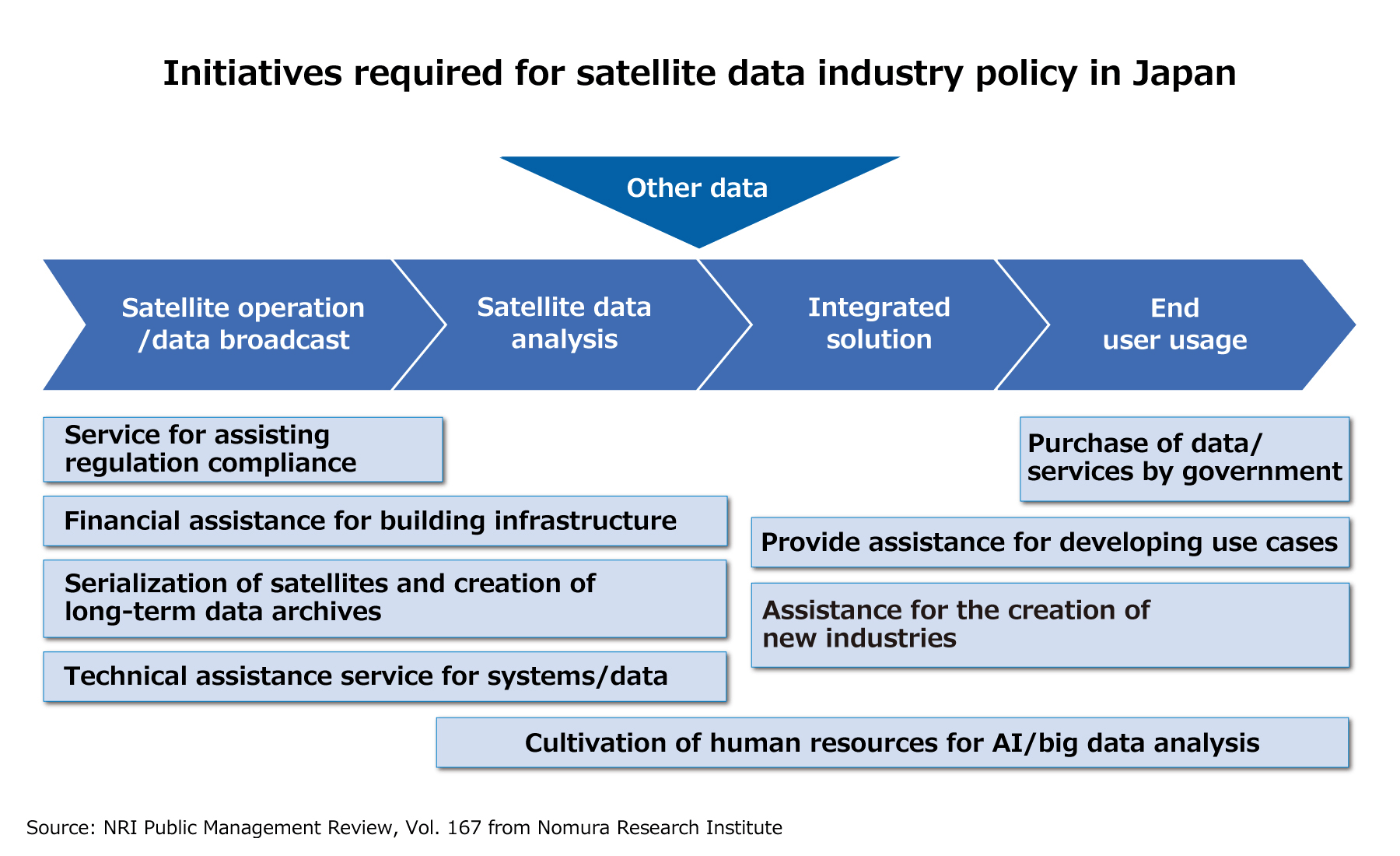
Can Japanese companies utilize their strengths?
The changing face of outer space development and the expanding outer space business (Part 2)
Although Japan was lagging behind the West in the outer space business, two laws related to outer space (Space Activity Law and Satellite Remote Sensing Law) were enacted in November 2016 and the Cabinet Office announced Space Industry Vision 2030 in May 2017. This vision aims to enhance assistance for cultivating ventures and double the current 1.2 trillion yen industry by 2030. We asked Masashi Sato of the ICT & Media Industry Consulting Department about the competitiveness of Japan and government support measures, etc.
The technical ability and uniqueness of Japan is an opportunity!
——How do you see the competitive ability of Japan in the outer space business?
In the competition for orbits and frequencies, the players who can quickly establish hardware reliability and safety, and perform frequent launches have an advantage. Western companies are prominent in these fields. The American company OneWeb announced that it plans to launch 700 communications satellites, and the American company Planet has announced that it plans to launch 200 remote sensing satellites. Both of these targets exceed those of national governments.
Although Japan cannot match these quantities, its technical ability is comparable. For example, the MICHIBIKI Quasi-Zenith Satellite System provides positional information with a measurement error of several centimeters, compared to the approximately 10 meters of the conventional GPS (Global Positioning System). This provides high-precision positioning that can enable accurate remote control of moving objects. Japan is also in the unique position of having one or two companies in all fields covered by American companies as well as in other fields.
There are only a few venture companies in the world that clean up space debris, such as disused satellites, but Japanese company ASTROSCALE is regarded as extremely promising; having recently raised 2.9 billion yen in funding. A venture from the University of Tokyo called Axelspace Corporation has also been expanding its business despite being in the field of satellite manufacturing and data provision, which is the most competitive in the industry. Japan can ensure its presence in the industry if companies like these can provide cutting-edge value in various fields.
Cultivating ventures with anchor tenancy
——What kind of support does the government need to provide?
A so called "all-Japan" way of thinking does not match the venture culture. However, outer space is related to national policy, and it is important for the government to become a customer.
The reason that American venture companies lead in this field is because of the change in policy at National Aeronautics and Space Administration (NASA). With budget declining after the retirement of the space shuttle, NASA started to focus on industry promotion measures in order to aim for outer space development that utilizes the power of the private sector, rather than doing everything alone. There are also several venture companies that benefited from NASA taking the initiative to become a customer based on the "Anchor Tenancy" arrangement. Space X is the leading example.
The Japanese government is also working towards industry promotion, with a focus on the Cabinet Office. By holding contests with prize money and appointing major figures in the worlds of ventures and economics as mentors, the government has changed direction to aid the cultivation of venture companies.

——What kind of effects can we expect from efforts such as legislation and the announcement of a vision?
Although legislation can prevent venture companies from operating with freedom, it also plays a role in defining fixed standards. If it is known that fixed rules are being complied with for the purpose of stable and secure operation, it will become easier for investors and large companies to invest in and cooperate with venture companies. I believe that the enactment of the two laws has actually led to media coverage and attention, and also led to increased investment from private companies.
Space Industry Vision 2030 clarified the future direction of the industry. It clarified what kind of players can enter the industry and provided scenarios for how business would be established. Since we have the necessary rules and scenarios, now all we have to do is to wait for action and for the money to start moving.

Masashi Sato ICT & Media Industry Consulting Department
Invigorating the outer space business together
——How did NRI become involved in the industry?
I entered the industry by myself due to personal interest. At first I was a volunteer, but I started working at NRI as JAXA and the government started to get involved. Although we use our knowledge and skills to assist government legislation and vision formulation, promote industry players, and match client companies with venture companies, I feel that what we are doing is closer to industry creation with associates both inside and outside the company, rather than consulting.
Satellite data is utilized in a wide range of fields including distribution, urban planning, and tourism, but the important thing is to determine the part of business satellite data can be utilized in. For example, even if image analysis data of petroleum tanks can be useful for a financial service, it will not be achieved unless someone notices. Since client companies and outer space venture companies often do not know much about each other, I hope that NRI can act as an intermediary.
- Anchor Tenancy is defined as “an arrangement in which the United States Government agrees to procure sufficient quantities of a commercial space product or service needed to meet Government mission requirements so that a commercial venture is made viable.”
Profile
-
Masashi Sato
* Organization names and job titles may differ from the current version.